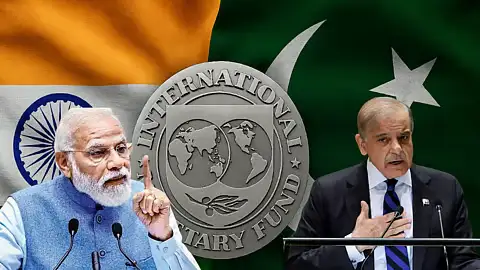Exclusive: IMF Says ‘Yes’, ‘No’ or ‘Abstain’ Votes Allowed — India’s Pakistan Loan Abstention Raises Questions
The International Monetary Fund (IMF) has clarified that Executive Directors (EDs) can vote “Yes,” “No,” or “Abstain” on financial support decisions for member countries. This clarification comes after India’s unexpected abstention during the IMF board vote on a $3 billion loan to Pakistan, which triggered debate and speculation.

Some media reports had claimed that EDs could not vote “No,” but the IMF corrected this narrative. An IMF spokesperson confirmed, “EDs can vote Yes, No, or Abstain.” The clarification has reignited questions about India’s diplomatic stance and the strategic thinking behind its decision.
India’s Decision Surprises Experts
The IMF recently approved a short-term loan package for Pakistan to help address its economic instability. India, despite its tense relationship with Pakistan, chose to abstain instead of opposing the loan. This move caught many experts off guard.
Former Indian Finance Secretary Subhash Chandra Garg commented, “This one did surprise me also – why did India not vote against and only abstained? That is the reason we don’t know, and the government should explain.”
His reaction echoes the views of many who believe that India had enough reason to oppose the loan but deliberately stayed neutral.
IMF Clears the Air on Voting Procedure
To address the confusion, the IMF clarified that all Executive Directors can freely vote for, against, or abstain on any proposal. This rebuttal counters claims that only a “Yes” or “Abstain” vote was allowed.
The IMF board includes 24 directors representing different countries or coalitions. Voting shares depend on each country’s financial contribution. For instance, India holds about 2.63% of the voting power. The clarification reinforces that India had full authority to vote “No” if it wanted.
What Was the Pakistan Loan About?
In July 2023, the IMF approved a $3 billion Stand-By Arrangement for Pakistan. The country faced a severe economic crisis, with low foreign reserves, high inflation, and growing debt. The IMF loan aimed to help Pakistan avoid default and restore confidence among investors and creditors.
The board approved the package just ahead of Pakistan’s elections. While the loan came as a relief to Pakistan, it stirred concern in India due to past allegations of misused aid and links to cross-border terrorism.
Given the strained relations, many had expected India to oppose the funding. Instead, the government stayed silent and chose abstention.
Why Did India Abstain?
The Indian government has not released an official explanation. However, foreign policy analysts suggest a few likely reasons for the decision:
- Strategic Neutrality
By abstaining, India signaled its disapproval without directly opposing the board’s consensus. This approach helped avoid diplomatic backlash while maintaining its stance. - Maintaining Multilateral Credibility
India often emphasizes its role as a responsible global stakeholder. A “No” vote might have appeared as politicizing a financial decision, which could have affected its reputation in international institutions. - Avoiding Conflict with Western Allies
Many Western nations, including the U.S., supported the loan to prevent further instability in the region. Opposing the loan might have clashed with their strategic interests. - Ineffectiveness of Opposition
Since most board members backed the loan, India may have felt that a “No” vote wouldn’t change the outcome. Abstaining allowed it to make a quiet statement without blocking the process. - Preserving Diplomatic Flexibility
India may have wanted to keep its options open by avoiding a firm “Yes” or “No.” This kind of ambiguity can offer strategic leverage in future negotiations.
Why the Silence Matters
Although abstaining can be a valid diplomatic tool, the lack of transparency has fueled public and expert speculation. Garg’s remarks reflect a growing demand for accountability in how India handles decisions involving countries with conflicting interests.
A former diplomat, who requested anonymity, said, “If India believes that Pakistan misuses foreign aid, then not opposing the loan seems inconsistent. At the very least, the public deserves clarity on the government’s reasoning.”
IMF Voting: A Quick Look
The IMF board usually operates by consensus but does hold formal votes when necessary. Each director’s vote reflects the financial stake of their country or group. Larger economies like the U.S. hold more influence, while countries like India have moderate voting weight.
Directors regularly use all three voting options. A “No” vote is entirely within the rules, and many countries have used it to express serious disagreement. The suggestion that it wasn’t available in this case was factually incorrect.
Final Thoughts
The IMF’s clarification ends the confusion about voting limitations. Executive Directors can fully express their country’s stance—whether that’s supporting, rejecting, or staying neutral on any proposal.
India’s abstention in the Pakistan loan case has sparked more questions than answers. While the move may have served a diplomatic purpose, it has also left many wondering whether it was the right message to send at a time when strategic clarity is crucial.
Until the government offers a direct explanation, speculation will continue. In geopolitics, silence often speaks volumes—and in this case, India’s quiet abstention says more than a simple “No” ever could.






